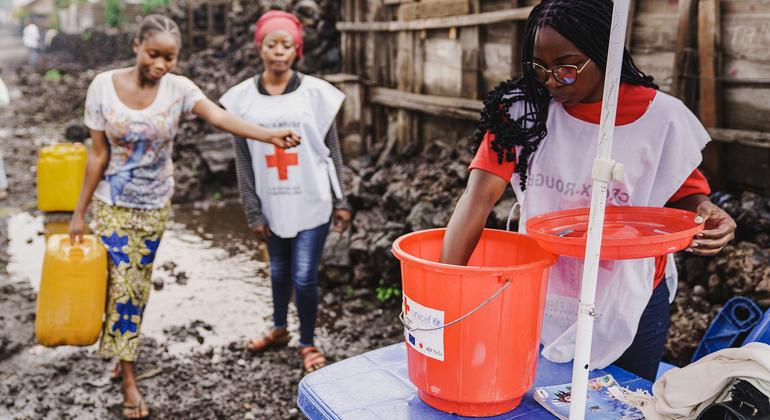“The heavy rains, widespread flooding and the high level of displacement are all fuelling the risk of cholera transmission and putting the lives of children at risk,” said UNICEF regional director for West and Central Africa Gilles Fagninou.
Cholera is an acute diarrhoeal infection caused by consuming food or water contaminated with bacteria. The disease can be treated with oral rehydration solution and antibiotics, but can be fatal within hours if untreated.
Young children are particularly vulnerable to cholera due to factors such as poor hygiene, inadequate sanitation and access to safe water and a greater risk of severe dehydration.
Regional hotspots
Active outbreaks in the hotspots of the Democratic Republic of the Congo (DRC) and Nigeria are fuelling the risk of cross-border transmission to neighbouring countries.
The DRC is the hardest hit country in the region, reporting more than 38,000 cases and 951 deaths in July.
Children under five now account for nearly 26 per cent of cases in the DRC, and without stronger containment measures, they may face the worst cholera crisis since 2017.
The situation in the capital, Kinshasa, is particularly critical as intense rainfall and widespread flooding have caused cases to surge sharply over the past four weeks. Straining an already overwhelmed healthcare system, the city is now facing an alarming case fatality rate of eight per cent.
Nigeria is the second most affected country in the region, with 3,109 suspected cholera cases and 86 deaths as of the end of June. Cholera is endemic in the country, where major outbreaks have re-occurred in recent years.
Region-wide crisis
Chad, Republic of Congo, Ghana, Côte d’Ivoire and Togo are also facing ongoing epidemics.
A total of 612 cholera cases were reported in Ghana as of 28 April, 322 cases and 15 deaths in Côte d’Ivoire as of 14 July and 209 cases and five deaths in Togo as of June 22.
Niger, Liberia, Benin, the Central African Republic and Cameroon are also under close surveillance due to their vulnerability.
UNICEF response
Urgent and scaled-up efforts are needed to prevent further spread and contain the disease across the region.
Throughout the outbreaks, UNICEF has delivered lifesaving health, water, hygiene and sanitation supplies to treatment facilities and communities.
The agency has also supported cholera vaccinations, scaled up preparedness and response efforts and encouraged families to seek timely treatment and improve their hygiene practices.
“We are in a race against time, working hand in hand with the authorities to deliver essential healthcare, safe water and proper nutrition to children already at risk of deadly diseases and severe acute malnutrition,” said Mr. Fagninou.
“Together with an array of partners, we are strengthening community engagement and extending our reach to remote and underserved areas, making every effort to ensure that no child is left behind.”
UNICEF West and Central Africa urgently requires $20 million over the next three months to scale up critical support in health, WASH, risk communication and community engagement.




